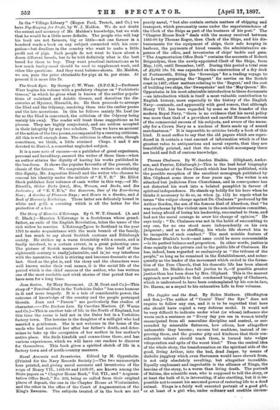The Greek Epic. By George C. W. Warr. (S.P.C.K.)—Professor Warr
begins his volume with a prefatory chapter on " Prehistoric Greece," in which he gives what is known of the earlier popula- tions of mainland and Asiatic Greece, and describes the dis- coveries at Mycena3, Hissarlik, Src. He then proceeds to arrange the Iliad and the Odyssey, resolving them into the earlier poems and the late accretions. In this he follows mainly Mr. Leaf (as far as the Iliad is concerned, the criticism of the Odyssey being mainly his own). The reader will treat these suggestions as he pleases. They are highly conjectural, and are seldom accepted in their integrity by any two scholars. Then we have an account of the action of the two poems, accompanied by a running criticism. All this is well enough done. The criticism is often acute, though sometimes, we think, a little strained. Chaps. 5 and 6 are devoted to Hesiod, a somewhat neglected subject.
It is a sure note of success—so a publisher of great experience, personal and hereditary, assured the writer of these lines—when an author attains the dignity of having his works published in the box-form. It shows the popular favourite of the present, the classic of the future. We congratulate two writers on attaining this dignity, Mr. Augustine Birrell and the writer who chooses to conceal his identity under the initials of " E. V. B." Mr. Elliot Stock publishes four volumes of each writer in this way,—of Mr. Birrell's, Obiter Dicta (two), Men, Women, and Books, and Res Judicatw ; of "E. V. B.'s," Ros Rosarum, Dew of the Ever-living Rose ; A Garden of Pleasure Days ; and Hours in a Garden, and A Book of Heavenly Birthdays. These latter are delicately bound in white and gold, a covering which is all the better for the protection of a box.


































 Previous page
Previous page